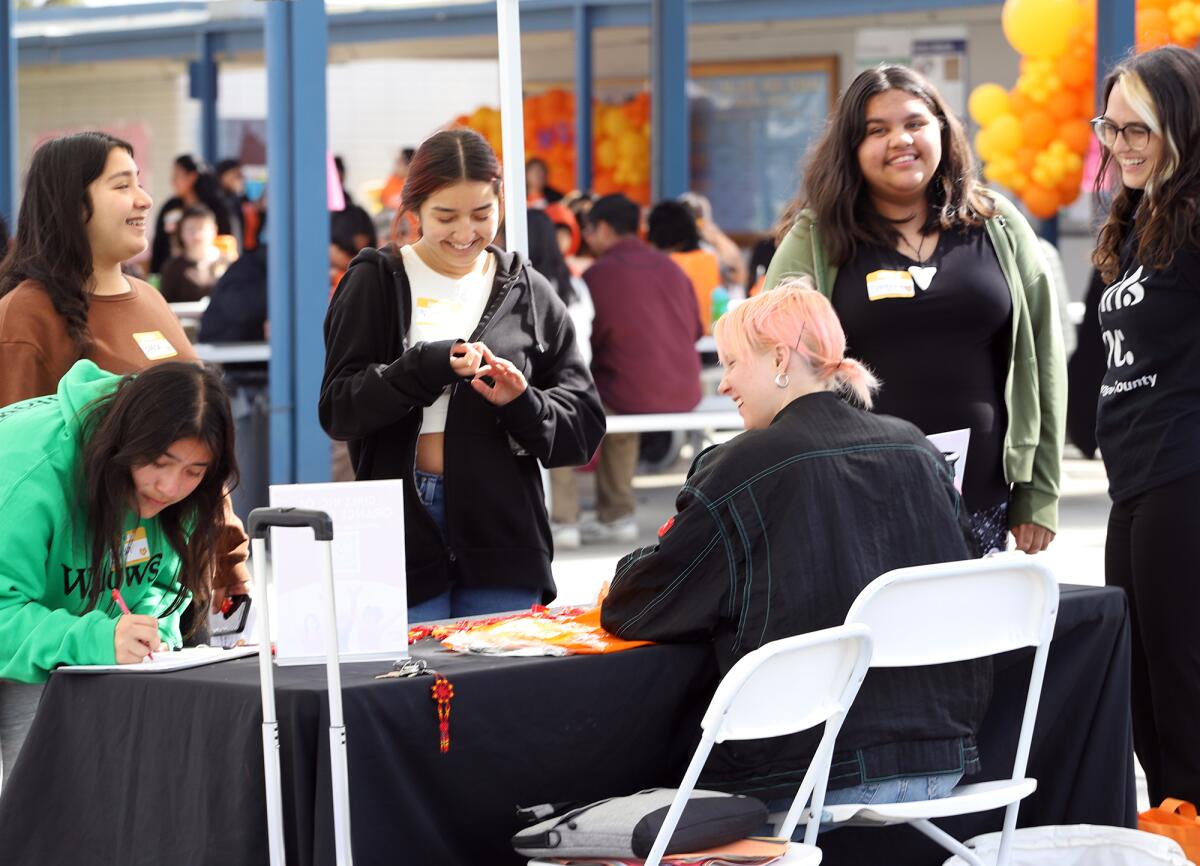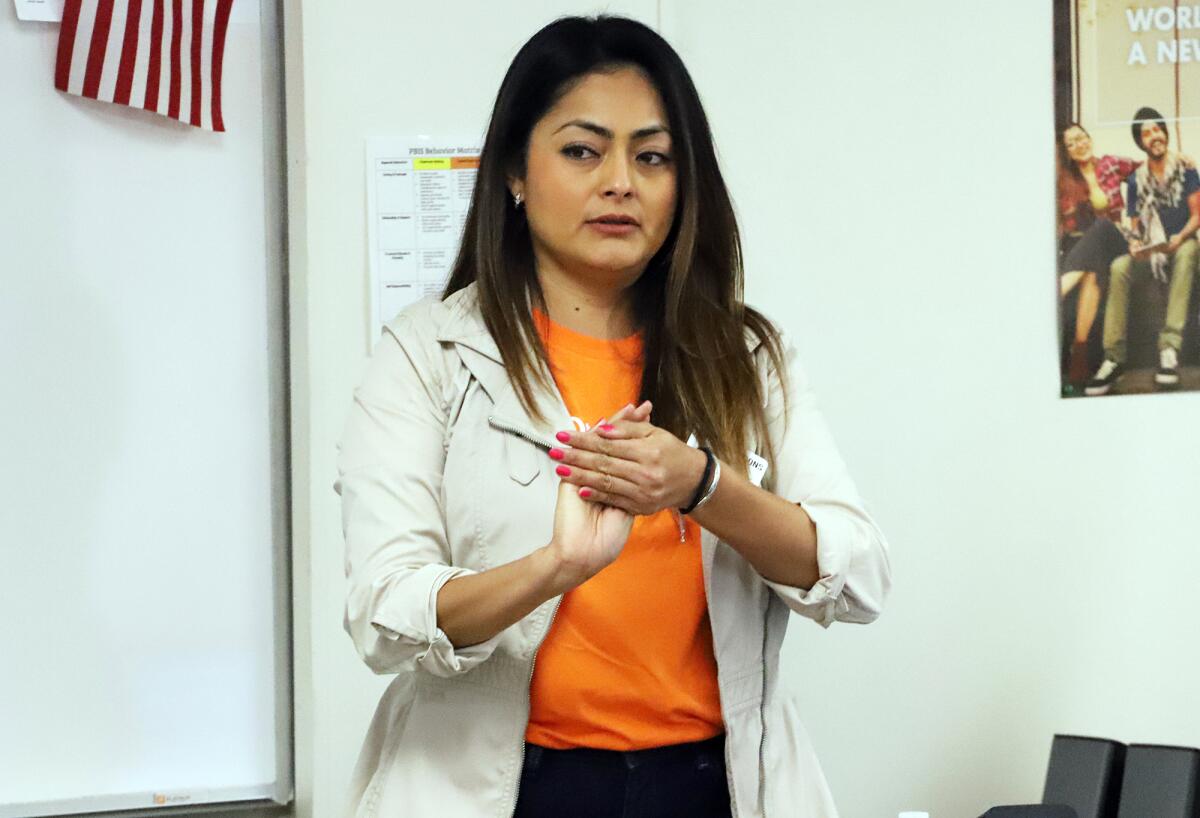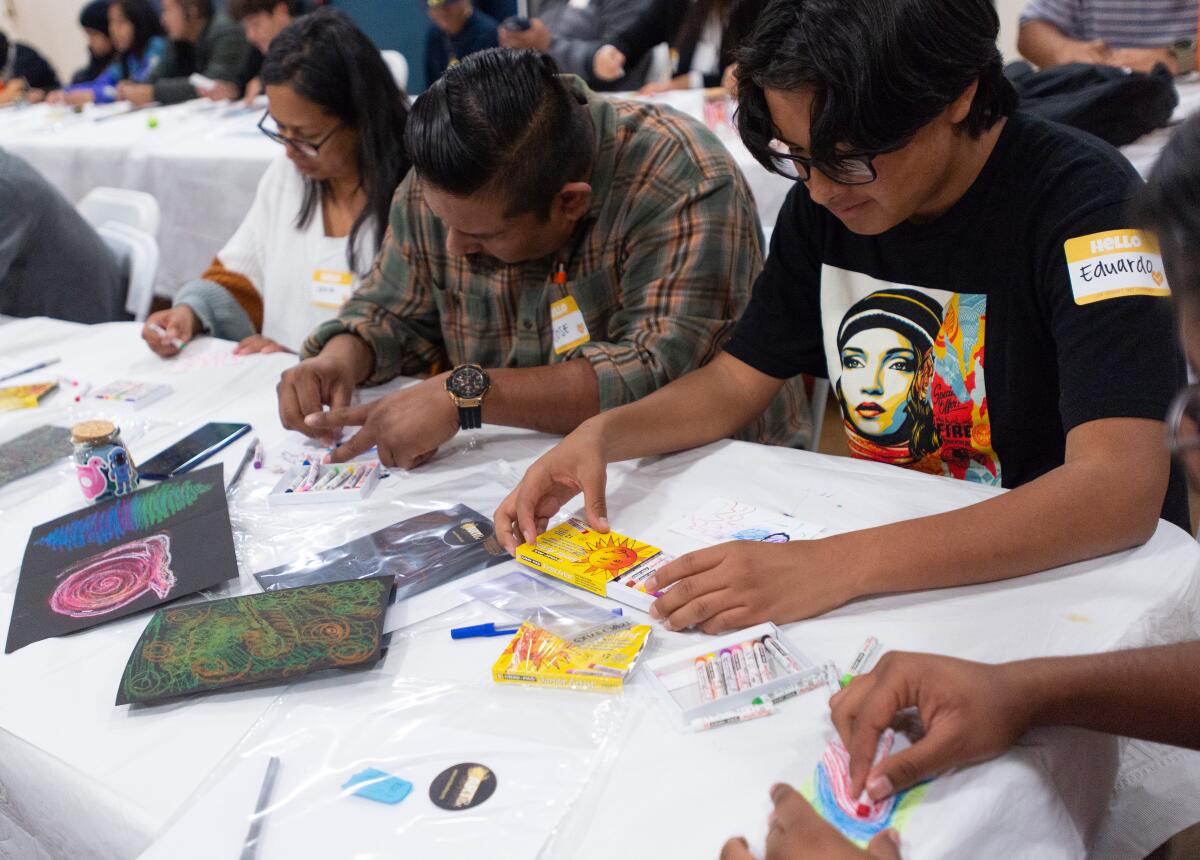Costa Mesa teen conference helps families communicate, highlights red flags of teen dating violence

Claudia Flores thought it was strange when she saw her younger sister lay an outfit neatly on her bed and take a photo of it before getting dressed one morning. Years later, she found out that the picture was for a high school boyfriend who insisted he should approve of what her sister wore each day.
That boyfriend also talked her into enrolling at a community college with him instead of accepting a four-year grant to attend Cal State Fullerton. That’s a decision her sister, now 33, has since grown to regret, Flores said.
The couple fought often, and whenever they did he would leave a teddy bear on her desk to try and convince her that things were all right. Today, she can’t stand the sight of that particular type of stuffed animal.
“She’s like, ‘Give me any other plush toy, do not give me a teddy bear,” Flores told parents during a breakout session of the Love Shouldn’t Hurt teen conference at Early College High School in Costa Mesa Saturday. “Because that’s the way he would say ‘I’m so sorry.’”

Jose Islas of Fullerton thought it was silly when one of his three sons and that son’s girlfriend began coordinating matching outfits with each other. He had even teased the boy about the gesture.
But after listening to Flores’ sister’s story, he decided it would be important to ask his son if he and his girlfriend were choosing how each other should dress because they wanted to or if either of them felt like they were being pressured to dress a certain way. He and Flores acknowledged it might be an innocent show of affection. But although his son appeared happy, Islas and his wife, Irma, wanted to be sure he was also thinking of the well-being of his young partner.
“My goal here is, first, to make sure my boys will respect girls,” Islas said Saturday. “Because this is serious. I want them to be able to love and have someone love them back healthily.”
About 18% of teenage girls and 11% of boys surveyed by the Centers for Disease Control in 2021 said they had been forced to have sex or some other form of intimate contact, according to a summary published Monday of a full report due in the spring. Around 60% of people between the ages of 12 and 18 experience some form of emotional or psychological abuse, Flores, a clinical outreach program manager with the nonprofit behind Saturday’s conference, Human Options, told attendees Saturday.

The event opened with a keynote presentation by Mario Valdespino, a junior at Anaheim High School and co-chair of the youth group Project S.A.Y. When he asked if anyone in the room had experienced abuse at the hands of someone they were dating, 15 out of the roughly 80 people who attended the conference raised their hands.
One of them was Ann Nguyen, a Garden Grove resident who works as a community liaison for the Savanna Elementary School District. She said cultural and social stigmas often prevent people from reporting or having discussions about abuse in a relationship, and many like her “have gone through this and had no one to talk to.”
“I feel like as adults we often disregard our younger generations and say, ‘Oh, we know the answers; we know what you need to do or how you need to feel,’” Nguyen added. “I don’t know Mario, but I’m proud of him. Because it’s not easy to get up and challenge parents, and me as a grandparent, to challenge us to do better, to be more open in our communication and say this is a problem.”
Melani Hernandez, 14, and her sister Sandy Hernandez, 16, said they were shocked by statistics illustrating the prevalence of dating violence they heard at Saturday’s conference. Even though they are close with each other and their mother, Alicia Martinez, it’s a topic that was rarely brought up between them or their friends. But as they talked about red flags of abusive relationships and chatted with other teens in breakout sessions away from their parents, they realized that they had seen examples of what they discussed firsthand.
“We saw, like, videos about relationships and both looked at each other,” Melani Hernandez said. “I’ve known her [my sister’s] past relationships, and I was, like, ‘I think you can relate.’”
Sandy Hernandez said she believes teenage girls feel more pressure than their counterparts to keep a relationship going. In her experience, being in one had been an idealized part of her identity that was difficult to walk away from, and she found herself doubting her own self-worth at times when things went sour with a partner.
About 57% of teenage girls and 29% of boys reported having persistent feelings of sadness or hopelessness at some point over the course of 2021 in the CDC’s survey. As many as 24% of the girls and 12% of the boys who took part said they had planned suicide.
On Saturday, Flores, Valdespino, Human Options chief executive Maricela Rios-Faust and others talked about technology and social media as ubiquitous, practically essential tools that have had a growing impact on the mental health of young people. Later, members of the youth empowerment group Girls Inc. walked conference participants through a series of exercises to help teens accept their bodies and be more comfortable in their own skin.
That was followed by a drawing session led by Art & Creativity for Healing, in which attendees processed their thoughts by choosing colors and shaping abstract forms representing their emotions. The group activities served as a bonding moment for many families, with some parents embracing their sons and daughters after proudly examining what they had created.

Throughout the day, parents were encouraged to try to maintain a dialogue with their kids about the challenges they might be facing, the relationships they form and whatever aspects of their lives they are willing to share. However, Alicia Martinez as well as Melani and Sandy Hernandez acknowledged that’s not always easy to do.
“I’ve always told them, “Hey be straightforward with me, be open. I’m you’re mom. I can tell you anything you guys wanna know,” Martinez said. “But they’re at that stage right now where it can be very hard to open up.”
That’s why the teens’ mother believes it’s important for parents to seek out resources like those offered at the conference. Her daughters said they not only learned a lot but were able to have honest conversations about possibly taboo subjects with their peers and experts without fear of being judged.
Newport Beach residents Rafaela Millar, 49, and Miguel Millar, 50, have been taking their family to the teen conference for the past six years and credit the lessons they learned for improving how they communicate with each other. The event had to be held online in past years due to the COVID-19 pandemic, so their son Miguel Millar Jr. was looking forward to having discussions in-person.
“I really didn’t want to come at first because I had to wake up at 7 in the morning,” Melani Hernandez said. “But when I came and listened to people, I had fun.”
She, Rios-Faust and others said the conference was about more than red flags and statistics. It’s a venue to share tips and experiences to improve existing relationships and encourage fulfillment in future ones.
“That’s why you’re all here today, to explain and to work with your kids around what you want for them, and that is healthy love,” Rios-Faust told attendees Saturday.

All the latest on Orange County from Orange County.
Get our free TimesOC newsletter.
You may occasionally receive promotional content from the Daily Pilot.




